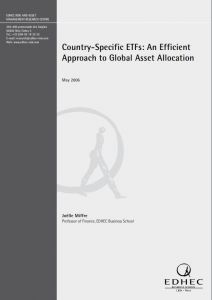

Country-Specific ETFs: An Efficient Approach to Global Asset Allocation
The article shows that country-specific exchange-traded funds (ETFs) enhance global asset allocation strategies. Because ETFs can be sold short even on a downtick, global strategies that diversify risk across country-specific ETFs generate efficiency gains that cannot be achieved by simply investing in a global index open- or closed-end fund. Besides, the benefits of international diversification can be achieved with country-specific ETFs at low cost, with low tracking error and in a tax-efficient way. For all these reasons, country-specific ETFs may be considered serious competitors to traditional country open and closed-end funds. A revisited version of this paper was published in the March 2007 issue of the Journal of Asset Management.
Author(s):
Summary:
The article shows that country-specific exchange-traded funds (ETFs) enhance global asset allocation strategies. Because ETFs can be sold short even on a downtick, global strategies that diversify risk across country-specific ETFs generate efficiency gains that cannot be achieved by simply investing in a global index open- or closed-end fund. Besides, the benefits of international diversification can be achieved with country-specific ETFs at low cost, with low tracking error and in a tax-efficient way. For all these reasons, country-specific ETFs may be considered serious competitors to traditional country open and closed-end funds. A revisited version of this paper was published in the March 2007 issue of the Journal of Asset Management.
Register to download PDF
Register/Log in| Type : | Working paper |
|---|---|
| Date : | 31/05/2006 |
| Keywords : |
Indices |

